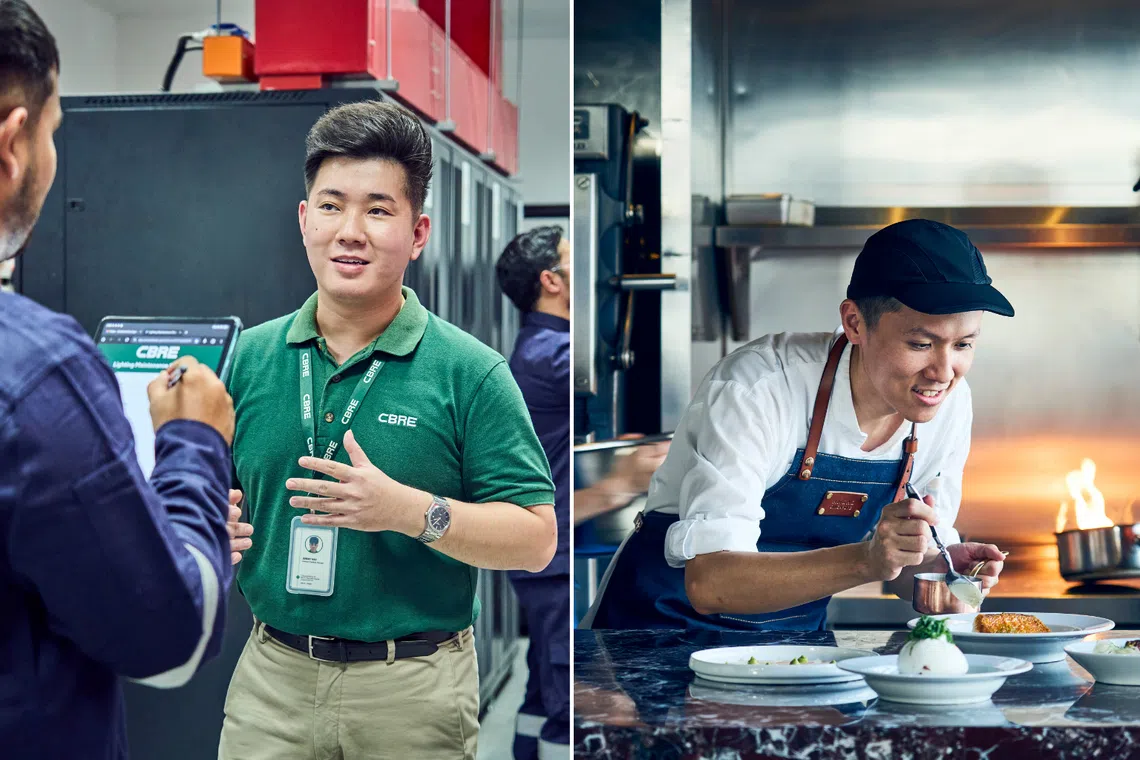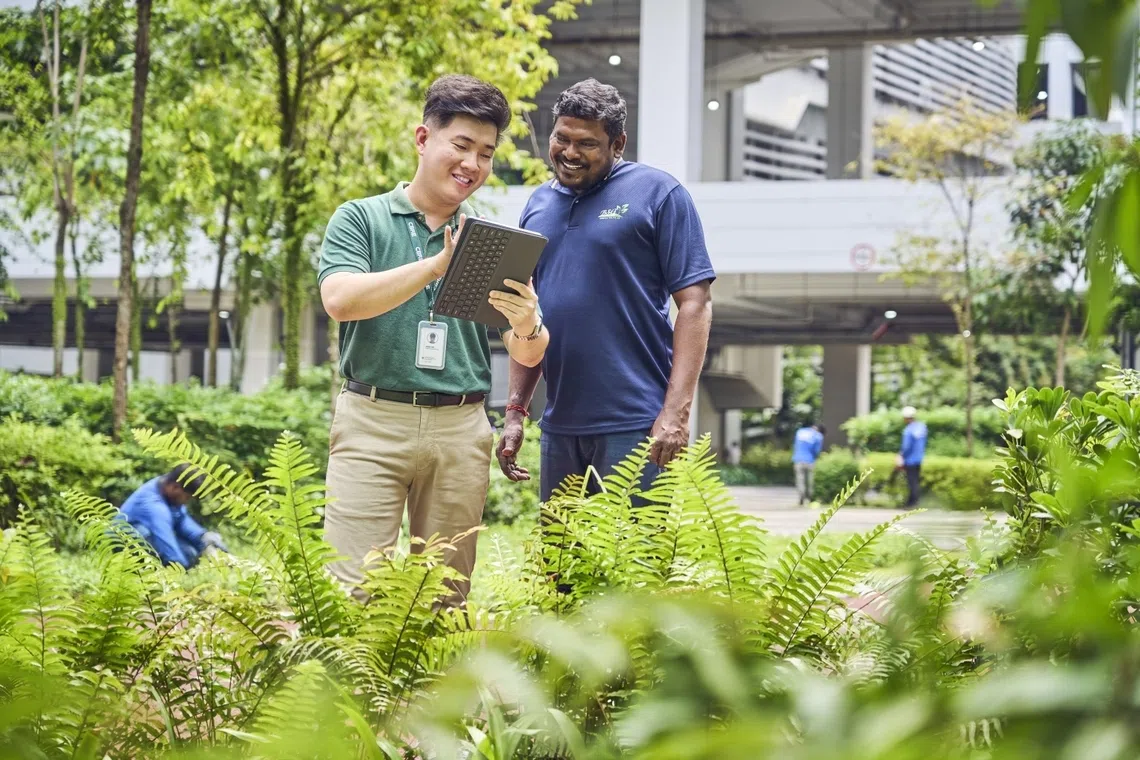Branded content
From theatre to facilities, labs to kitchens: How two S’poreans found their stride in surprising careers
By stepping beyond their fields of study and making detours into overlooked sectors like facilities management and hospitality, they discovered growth, purpose and pride

(From left) Assistant facilities manager at CBRE Global Workplace Solutions Jeremy Neo and chef de partie at Andaz Singapore’s steakhouse 665°F Ng Teng Yang pivoted from their original fields of study to discover fulfilling careers that play to their strengths and passions.
PHOTOS: SPH MEDIA
With a diploma in arts and theatre management, Mr Jeremy Neo once imagined a career behind the stage lights.
Instead of managing events and performances, the 28-year-old now oversees the critical operations and maintenance that most office workers take for granted.
“In my line of work, I speak to many tenants and stakeholders, and I enjoy that,” Mr Neo says, who is now pursuing a part-time degree in facilities management. “Just like in events, working with people has always been one of my strong suits.”
As an assistant facilities manager at CBRE Global Workplace Solutions, he leads a team of 12 technicians and property executives. He is responsible for more than 300,000 sq m of working spaces across three buildings in JTC Defu Industrial City, ensuring that thousands of employees can work comfortably and safely each day.
Before taking on his current role, Mr Neo coordinated events as an intern with a theatre production company while studying at Republic Polytechnic. After graduating, he worked on a contract basis in a hospital’s operations team. Those experiences gave him an early appreciation for behind-the-scenes work.

As part of his role, Mr Neo reviews landscaping works with horticulture vendors to ensure the grounds at JTC Defu Industrial City remain safe and welcoming for tenants.
PHOTO: SPH MEDIA
The switch to facilities management has also given Mr Neo what he values most – predictable hours and uninterrupted weekends. Even though his friends think his job sounds dull, no day is ever the same.
“Just 30 minutes before this interview, I was handling an incident where a lorry hit one of the height limit signs at our building,” he says. “The sign is now hanging in midair. The area is cordoned off to ensure no one is hurt, and we will need to coordinate with multiple parties to resolve the matter.
“We have become accustomed to these sorts of incidents. It’s about having the problem-solving mindset, rather than just lamenting about the problem.”
Mr Neo’s curiosity has helped him land his current job. However, according to Workforce Singapore’s

Mr Neo works with the team at the fire command centre to ensure the ventilation systems are operating as designed to control smoke movement during fire drills and emergencies.
PHOTO: SPH MEDIA
“Many feel anxious when they see their friends landing ‘ideal’ jobs while they are still trying to figure things out,” says Ms Vimala. These so-called “ideal” jobs, she explains, are typically the well-trodden paths – positions that appear stable and prestigious – or careers in line with their academic routes.
Job security for young graduates Ministry of Manpower’s latest labour market report
“The disconnect could stem from the difference between what’s available in the job market and what feels accessible or meaningful to young job seekers,” says Ms Vimala.
Many of these perceptions, she adds, are shaped by common misconceptions about what defines a successful career.
Rethinking career pathways
According to Ms Vimala, one of the biggest barriers to how young job seekers approach their careers is the belief that their roles should be high-paying or come with a glamorous title.
“Many young people assume success is defined purely by salary or status,” she says. “However, I’ve observed that true satisfaction often comes from work that aligns with a person’s values, interests, personality and skills, or VIPS.”
For instance, I once worked with a graduate who pursued a banking role because it ‘looked successful’, but later found more fulfilment in a client-facing consulting role that paid less but matched her VIPS better.”
She adds that success does not always mean climbing the ladder. “It can also mean developing new skills, finding work-life balance, or engaging in meaningful work.”
Many young people also assume they need to have everything figured out right after graduation, Ms Vimala says.
“Modern career trajectories are no longer linear,” she counters. “It is acceptable to take some time to reflect and try things out, so that you can better identify what jobs might vibe with you.”
Shifting mindsets, she believes, is key to helping young people embrace unconventional paths – as in the case of 33-year-old Ng Teng Yang, a chef de partie at steakhouse 665°F in Andaz Singapore.

Mr Ng built his culinary foundation at Andaz Singapore’s Alley on 25 before moving to the hotel’s steakhouse 665°F, where he continues to perfect his skills and cooking techniques in different cuisines.
PHOTO: SPH MEDIA
Mr Ng studied materials science at Singapore Polytechnic and had envisioned working in a laboratory after graduating in 2012.
“I liked to do lab work, and wanted to be in a job where you do testing, write the report and then submit it,” he recounts.
Before he could enter the workforce, he enlisted in national service. It was then that he started cooking during his free time. The new hobby soon revealed his passion for the craft and a knack for Western dishes.
“I saw how people enjoyed the food that I cooked and decided to enrol in Shatec after serving NS,” he says. Shatec is a hospitality training school.
“My friends asked me why, and I told them that it was more important to enjoy my work than to work in a normal nine-to-five job,” he adds. “My parents were not supportive at first, but they eventually noticed what I really enjoy doing and went along with the flow.”
Upon graduating from Shatec in 2017 with a diploma in culinary arts, Mr Ng joined Andaz Singapore’s all-day dining restaurant Alley on 25 as a commis chef. He was promoted to demi chef in 2021 and rose to chef de partie in 2022, before transferring to 665°F in 2024.
Apart from mastering different Asian and Western cuisines in the outlets, he has learnt people management and communication skills – qualities that keep a kitchen and operations running smoothly when hundreds of orders pour in.

Managing inventory and ingredient orders, Mr Ng draws on his materials-science training to plan precisely and minimise waste in the kitchen.
PHOTO: SPH MEDIA
His time spent in the school laboratory was not in vain, as his foundation in science has helped with his cooking.
“In the lab, you measure, record and test until you get it right,” he says.
“In the kitchen, every dish requires accuracy, from weighing ingredients to controlling the temperature of the grill. I keep experimenting, asking what happens if I tweak a technique or adjust a flavour, and this keeps the craft alive for me.”
Like Mr Neo, Mr Ng’s journey underscores Ms Vimala’s point that career fulfilment often lies outside conventional expectations, and can be found in overlooked sectors such as retail, maritime, facilities management, logistics and hospitality.
Ms Vimala says: “These sectors are essential to Singapore’s economy and are evolving rapidly with technology and innovation. For example, logistics now involves digital supply chain management and data analytics.
“They offer structured career pathways, opportunities for upskilling, and the chance to build transferable skills such as problem-solving, teamwork, communication and service excellence – all highly valued across industries.”
Making sense of job hunting
Workforce Singapore (WSG) career coach Vimala Ramasamy addresses common questions young job seekers have about finding the right job.
1. Why is it difficult for me to land jobs even though there are many vacancies in the job market?
You are not alone in feeling this disconnect. The roles advertised may not align with your goals or values, but being selective is part of career planning.
Today’s professionals, particularly younger job seekers, prioritise purpose, growth opportunities and work-life balance alongside salary. This can make the search longer, but often more rewarding.
Another challenge is the “experience requirement” in some entry-level roles. To address this, showcase your transferable skills from internships, school projects and volunteer experiences strategically.
These can include project management skills honed by completing group projects or customer service skills gained from a part-time retail job.
Job search can be challenging, even for experienced professionals. Stay positive and continue to build your network for more opportunities.
2. What can I do if I feel lost or stuck in my job search?
First, understand that feeling lost is completely normal. Job searching can be mentally and emotionally demanding. It helps to first identify what is causing the frustration – whether it is a lack of direction, repeated rejections or self-doubt.
Career coaches like myself create a safe space for discussion, taking the time to listen and find out what is truly behind those feelings.
A useful starting point is to consider the VIPS framework: values, interests, personality and skills. This process brings clarity to what truly matters, and helps identify work environments where you can thrive.
It is also important to recognise “burnout skills” – abilities that you are good at but do not enjoy using – so you can avoid roles that drain your energy.
3. Should I consider an internship or short-term role in an unfamiliar field?
Yes. I often witness huge personal and professional growth among young job seekers who do so.
Initially, many may feel uncertain or question whether the experience will align with their long-term goals. Eventually, they uncover new capabilities, such as adaptability, problem-solving skills, and the ability to communicate across different teams, or across various organisational cultures.
Even if the role is short-term, it often becomes a defining moment in how they view their potential and future career direction.
WSG also offers several programmes to help you gain confidence in this process. The GRaduate Industry Traineeships programme
The Career Starter Pack
If you would like to connect with industry mentors for real-world advice and get some help in charting a personalised career plan, you can sign up for Polaris by Volunteer Career Advisors
Find out more about the current hiring market in Singapore and tips to land a job after graduation.



